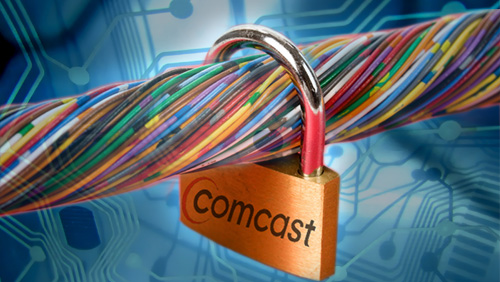We’ll all be hearing a lot more about net neutrality in the coming weeks. The Federal Communications Commission is set to officially put forth its net neutrality proposal, which involves allowing internet service providers to accept payments for privileged network access, at its May 15th meeting. The proposal will not yet become policy. Instead the commission will request input on the proposal – and a coalition of internet companies is banding together to begin the processing of offering direct input before the meeting ever begins.
 FCC Chairman Tom Wheeler, the ex-lobbyist for the cable and wireless industries who was appointed by President Obama last year, wrote a lengthy post on the FCC’s blog last week detailing all the reasons that the internet just needs to stop its whining and accept its fate as the new profit conduit for dinosaur cable companies. He didn’t say this in so many words, but he did imply from the beginning that opponents of the proposed rules simply don’t understand them – something Sen. Al Franken (D-MN), who has stated that the rules would “destroy” the internet, would probably take issue with.
FCC Chairman Tom Wheeler, the ex-lobbyist for the cable and wireless industries who was appointed by President Obama last year, wrote a lengthy post on the FCC’s blog last week detailing all the reasons that the internet just needs to stop its whining and accept its fate as the new profit conduit for dinosaur cable companies. He didn’t say this in so many words, but he did imply from the beginning that opponents of the proposed rules simply don’t understand them – something Sen. Al Franken (D-MN), who has stated that the rules would “destroy” the internet, would probably take issue with.
Wheeler’s tone in the post is that of a bemused uncle. Worse, his explanations feel an awful lot like the stances the NSA would take if its focus were making money instead of national security. He stakes out a position early on as someone who’s concerned that “Internet Openness is being decided on an ad hoc basis by big companies,” despite being a lifelong shill for those very companies. He tells us that he’s a strong proponent of an “Open Internet,” which differs from an “open internet” not only in capitalization but also in its very definition since true open networks don’t privilege any users over any others.
Wheeler plays NSA-like word games, calling his plan to allow cable monopolies to double-charge for content “net neutrality” while he explains to us that what we thought was net neutrality really isn’t. And he continually points out that any ISP that “degrades” service will be punished, dancing around the fact that ISPs’ plans to milk content providers dry rests on the ability to endlessly upgrade over a baseline speed that they can lobby to keep so low as to render it meaningless. He also very carefully misses the point that the FCC doesn’t have a clear legal authority to require that the ISPs offer baseline speeds.
Attempting to settle the fears of those who worry about the impact on innovation, Wheeler says that the FCC will “act as necessary using the full panoply of our authority” if the “arrival of the ‘next Google’ or the ‘next Amazon’ is being delayed or deterred.” This completely glosses over the fact that nobody knew that Google or Amazon themselves would be important when they were first starting out. The open internet that Wheeler is ready to destroy allowed hundreds if not thousands of companies like Google and Amazon to start up, test their business models, and either thrive or fail in an open marketplace. If start-ups have to pay to play from the beginning there simply won’t be very many of them, depriving consumers of the best possible products and practices that come from a level playing field.
Where Wheeler gives away the game is the point where he bemoans “talking about net neutrality for a decade” and uses that as a reason to implement his proposed rules “in a timely manner.” The big ISPs want to start making more money without providing any new services as quickly as they can, particularly if reclassification as a utility remains an option as Wheeler insists it will. The story of internet policy over the last decade has been the expansion of the largest ISPs’ influence on the shape of the internet, and they want to finish remaking it in cable’s image before the government has a chance to enforce everyone’s right to equal access.
That the ISPs want to get the ball rolling as quickly as possible means the time for action is now, and companies who rely on an open internet for their business seem to realize this. Tech start-ups are banding together for a “day of action” on May 15th, organized by Engine Advocacy. It remains unclear at the moment exactly what action will be taking place. Some sort of a rehash of the SOPA protests from a few years back seems likely; Reddit co-founder Alexis Ohanian is crowdfunding a billboard ad to run outside the FCC’s offices much like he did during that crisis.
Tech giants are also getting ready to press the FCC. Netflix and Google are reportedly planning a “media blitz” in the hopes of turning the public against the FCC proposals. Mozilla has a different plan entirely: it is petitioning the FCC, asking it to split the difference and regulate some parts of ISPs’ business as common carrier utilities and others in the current manner. That’s a bolder move than anything else that’s been leaked so far, but it’s also just as likely to be fought by the ISPs’ considerable lobbying presence – not least of all the ex-lobbyist who’s now running the FCC.





